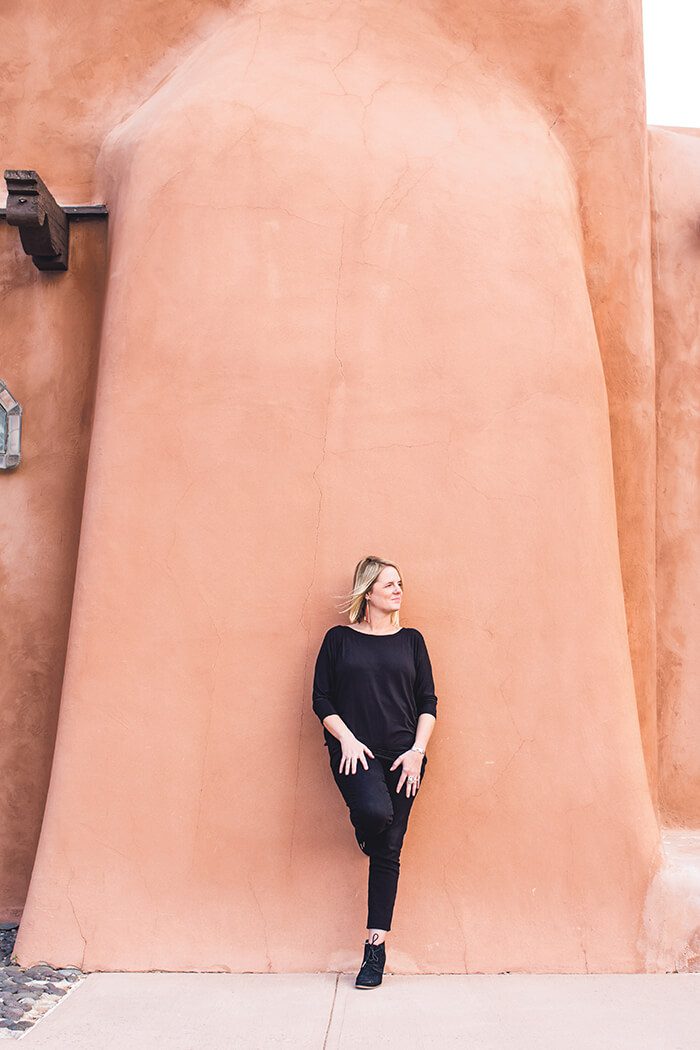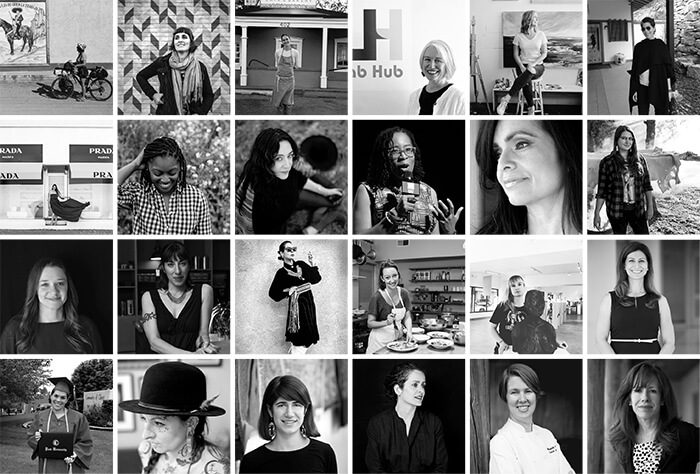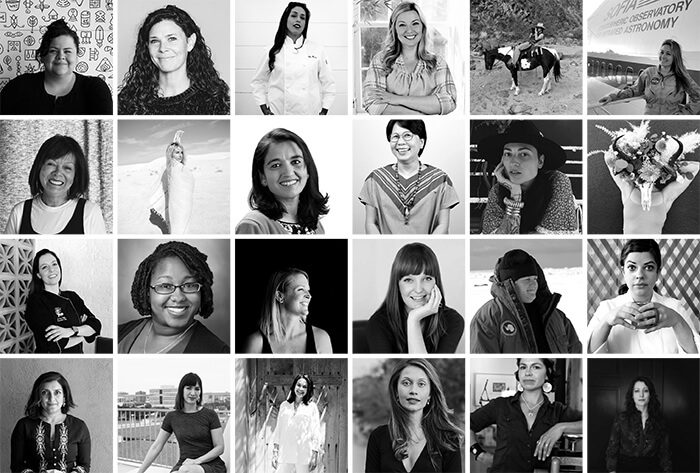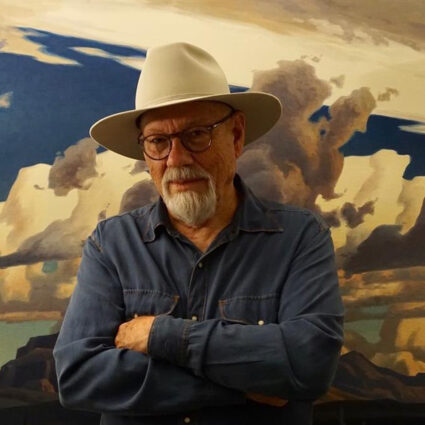
A year after Tricia English graduated high school in Kansas City, Kansas, her friends offered her someone else’s plane ticket to Chicago. “Two friends of mine were going there to look at Columbia College, and their friend had bought a nonrefundable ticket but couldn’t make it,” English says. She took the free flight and successfully impersonated the original ticket holder, despite the fact that they looked nothing alike. “I used her ID, even though she had dark hair and I had a blond pixie cut. Totally different faces,” English says with a grin.
English’s stint as a stowaway is a fitting first parable to explain how she found her way to the present moment in her life and career. Twenty years after that flight, she’s the creator and editor of UNUM Magazine, an online publication (unummagazine.com) that provides a platform for remarkable women from across the world to tell their stories. Like the Chicago trip, founding UNUM was a wild leap of faith for English—and she’s made many more of them in between.
Moreover, that long-ago journey to the Windy City saw English literally step into the shoes of another woman. On the trip, English and her friends scoped out a brownstone on the intersection of Montrose and Clark, and ended up renting it together. “I called my parents and said, ‘I’m moving to Chicago.’ They were floored,” she says. “I’ve always been somebody who needs to keep moving. That’s the way that I live.” One wonders what became of the woman who didn’t take the flight and if she had an inkling that her surrendered ticket changed the course of a life.
English and her contributors—there have been eighty-four since UNUM’s inaugural issue last June—also invite their readers to walk their paths, albeit in a metaphorical sense. English has crafted the publication as an experiment in radical empathy. Her mission is reflected in the magazine’s name, a reference to the traditional United States motto E pluribus unum. “Out of many, one,” English translates. “So many women have added their voices that it’s kind of taken on a mind of its own.”
UNUM’s editor-in-chief sips a chai latte at Java Joe’s on Siler Road, where she interviews many of the local women who appear in the magazine. In the year since English started the publication, she has released four issues. Each centers on a theme or professional discipline: the first was about journeys, while subsequent releases have featured women in the sciences, agriculture and food fields, and the arts.
English conducts in-depth conversations with her subjects, transcribes their words, and weaves together testimonials. She’ll kick the stories back and forth with the women and run them by her husband and volunteer copy editor, Christopher Hall. She creates a landing page on UNUM’s website for each issue; each one a beautiful grid of portraits that link to remarkably candid tales of the women’s lives.
“There’s a woman that came out in the magazine. There are three women who told stories they’ve never told anyone before. People have talked about sexual assault, and addiction, and all sorts of things,” English says. “It’s giving this platform to be comfortable with saying what you need to say, because I think that’s what we all need right now.”
The digital publication is starting to gain real-world traction: women from across the globe contact English daily to pitch their stories. As UNUM’s popularity grows and English’s vision for it expands, story threads that run through her own life have looped around and intertwined in unexpected ways.

The Tattoo
English was seventeen years old—and armed with a permission slip from her mother—when she got her first tattoo. Her parents had split up when she was a small child, so she played the classic game of divide and conquer in pursuit of fresh ink. “It was literally barbed wire around my arm, like Pamela Anderson,” English says. “That was actually before Pamela Anderson got hers, and I ended up covering it later.”
English has an enormous, devoutly Catholic extended family. “I grew up with my brother, and I also had seven cousins who were boys, so I was the first girl in the English family,” she says. “I was totally the ornery one—I would tell on all of them.” English solidified her role as the black sheep when she moved to Chicago. Each time she returned to Kansas City, there was some speculation among her family members as to how many tattoos would dot her arms. “I think it helped them realize that even if my hair was black or pink or red, or if I had tattoos and smoked cigarettes, I could still be a good person,” says English. “They didn’t ever judge me.”
Right after her move to Chicago, English took a job at a record store and found her way into the scrappy counterculture of the city. “In high school, my dad told me I could play flute or clarinet, so I chose the drums,” English says. “I was in a band called Conspiracy, and we spray painted all the walls of my friend’s basement with the band name.” It was only natural to start a grown-up band to fit her new, metropolitan life in Chicago. She teamed up with two women and formed Mother Trucker, a rock and roll outfit with heavy metal, rockabilly, and 1970s rock influences.
“Being the person that I am, I had to have a specific drum set. It was a 1970s Ludwig Silver Sparkle set, and I had a red velvet chair as my throne,” English says. The band played progressively bigger venues around Illinois and recorded an album, pushing English far out of her comfort zone. “I’m introverted and kind of a nervous nelly,” she says. “At shows, the drummer was usually on a high rise, really exposed. I’d hide backstage before shows, and take a shot of whisky right after we got off to calm my nerves.”
These days, English sports two half-sleeves of colorful tattoos. Aside from a delicate blue anchor on her finger, they’re currently hiding under her top. She’s forged careers in retail management, interior design, and graphic design in the eight years she’s lived in Santa Fe and mostly keeps her tattoos covered in her professional life. “I just turned forty, and now I think of my tattoos as a social experiment,” English says. “I can’t tell you how differently I get treated when they’re out and when they’re not. You have to get through the visual to see the person, and there are people who block that off immediately.”
Her favorite tattoo is a winged face with its eyes shut tight on her left arm, which she commissioned shortly after she moved to Chicago. “The image is based on a tarot card from a deck my friend had,” English says. “The idea behind it is to look past physical appearance, to close your eyes and dive deeper.”
The tattoo is a perfect de facto symbol for UNUM’s empathic ethos, and it harkens back to a time in English’s life that has informed her editorial process. Her experience in the do-it-yourself arts world of late 1990s and early 2000s Chicago taught her that anything is possible if you roll up your sleeves. “The way we worked then is still how I approach projects,” she says. “If I’m interested in something, I’ll do it. I’ll figure it out myself, or I’ll get help, and I kind of do that with everything.”
English had never designed a website before starting UNUM and didn’t have experience in journalism. She originally dreamed up the project as a coworking space for female designers but shifted away from the brick-and-mortar concept to cut costs. “I said, ‘I’m going to just speak to these women that I would want to work with,’” she explains. “The first issue was all women I knew, and the idea was to support them by showcasing who they are. I asked all of them the exact same question, but you would never guess that from reading the stories they told.”

The Pram
“The cabin was off the grid, and our heating was a stove,” says English. After six years in Chicago, she had moved to New Mexico in her freewheeling way. Tired of the city, she packed up all of her things and headed southwest on the invitation of a friend. English briefly resided in Santa Fe and Albuquerque before landing in the village of Pecos, surviving on the bare necessities with the man who would father her eleven-year-old daughter, Chloe.
The cabin was a universe away from Chicago, but soon she moved much farther. Her partner took a job in Melbourne, Australia, while she was pregnant, and English followed him overseas just four months after Chloe’s arrival. “I took her to get a passport the day after she was born,” she says. “I remember I had to hold her neck up for the passport picture.” They lived for four years in Australia, before English and her partner split up, and they all moved back to New Mexico in 2010.
“In Australia, I didn’t drive, so I rolled Chloe’s pram around everywhere for years,” says English. She enrolled in college for the first time to earn a degree in fashion business and also worked at a restaurant. “I decided a couple months in to join this mothers group and made friends that I still keep in contact with,” she says. “I’ve always kind of found myself surrounded by incredible women.”
A number of those women—from Missouri, Illinois, Australia, and, of course, New Mexico—have appeared in the virtual pages of UNUM. There’s a story from Lori Halpern, English’s friend since the fifth grade, about her career as a nurse and holistic health coach and how she’s been influenced by her own health struggles. The friend who invited English to New Mexico, Jamie Sampere, spoke about switching careers from photojournalist to ER nurse.
Ayesha McWilliams, who befriended English in Melbourne, recounted her struggles with an unknown autoimmune disease and her mental health activism. English’s cousin Gina contributed a story about her husband’s battle with drug addiction and her path to becoming a social worker.
“What I love about it is the intersection that keeps happening,” says English. “There are a lot of women in New Mexico in each one, but I want to be able to bring different parts of the world to New Mexico and New Mexico to different parts of the world.” By the publication’s second issue, English was interviewing women from across the nation and the world—many of whom she had never met.
English has an ambitious vision for the project that fits the global scope of her coverage. She plans to launch an online store featuring handmade products by the artists and designers who’ve appeared in UNUM, and she recently engaged Santa Fe nonprofit Little Globe as a fiscal sponsor to apply for grants. Local writer Maria Egolf-Romero has penned several profiles of local women for UNUM, and English wants to eventually engage other freelance writers as contributors.
For the magazine’s next issue, which will debut in August and highlight female leaders in different fields, English is planning an international call for story submissions. She also wants to create a printed compilation of stories from the first year of UNUM and possibly put on a local art exhibition of the portraits that have appeared in the publication.
“I’m trying to figure out next steps, because I have pushed very hard for a year,” says English. Her biggest supporters are her husband, Christopher Hall, a professional journalist who’s helped polish UNUM’s copy, and her daughter. “Chloe has read some of the stories, the ones that are appropriate for her,” says English. “She really wants me to do an issue about women in sports. She told me, ‘I want to read about athletes, mom!’ As long as I’m making her proud, there’s no telling where I’ll take this thing.”



